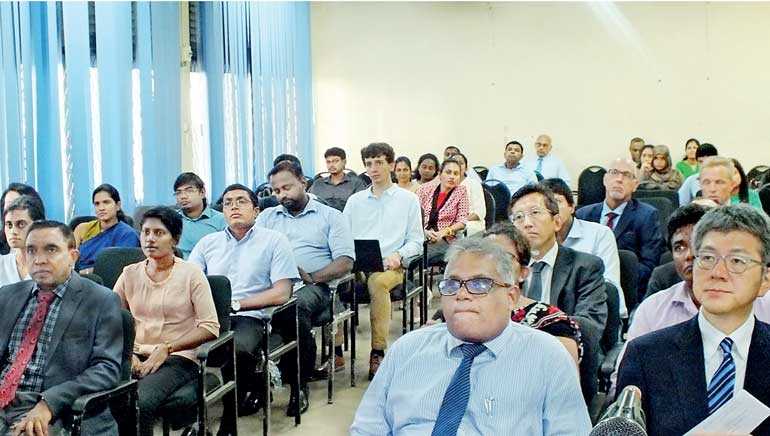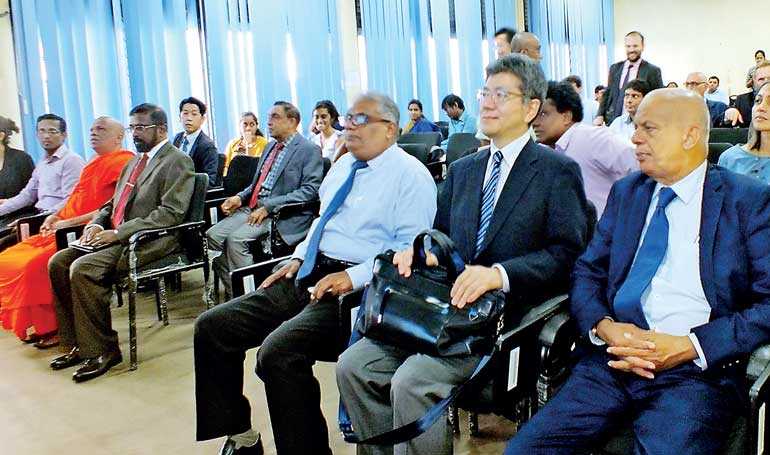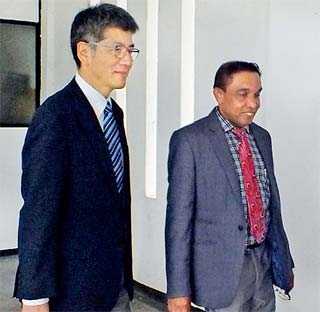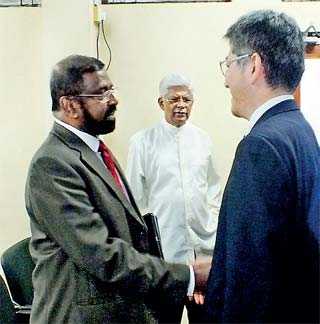Wednesday Feb 18, 2026
Wednesday Feb 18, 2026
Wednesday, 16 October 2019 00:37 - - {{hitsCtrl.values.hits}}

Participant of the ‘Free and Open Indo-Pacific Vision and Belt and Road Initiative’

Participant of the ‘Free and Open Indo-Pacific Vision and Belt and Road Initiative’
Internationally-renowned Japanese Professor of Contemporary Chinese Politics at the Graduate School for Law and Politics and Dean of the Graduate School of Public Policy at the University of Tokyo, Akio Takahara, delivered a thought-provoking lecture on ‘Free and Open Indo-Pacific Vision and Belt and Road Initiative’ at the Department of Economics of the University of Colombo recently.
 |
| Prof. Akio Takahara of Contemporary Chinese Politics at the Graduate School for Law and Politics and Dean of the Graduate School of Public Policy at the University of Tokyo with Colombo University Senior Professor in Economics Prof. Sirimal Abeyratne |
 |
| PF Centres for Indo-Lanka Initiatives and Law of the Sea Director Prof. Admiral Colombage, Pathfinder Foundation Chairman Bernard Goonetilleke and Prof. Akio Takahara |
The Pathfinder Foundation is planning to hold a series of similar events in cooperation with Department of Economics, University of Colombo and Free and Open Indo-Pacific Vision and Belt and Road Initiative’ is the first of the series.
Prof. Takahara during his lecture elaborated how Japanese perception of Chinese has been formed by territorial and maritime issues. He mentioned that Chinese perception on Japan has been changing over the years, and many Chinese hold Japanese in high regard because of the country’s adherence to international law. Prof. Takahara also applauded the Japanese Government’s continued conditional support to the BRI based on openness, transparency, fairness, fiscal soundness and economic viability.
The centre point of discussion during the lecture was for Sri Lanka to look for multilateral foreign investments and not only adhere to investments flowing from a single a country.
Senior Professor in Economics Sirimal Abeyratne pointed out that EU, USA and Japan had the opportunity to invest in Sri Lanka during 2015-2017 but they were not realised. Then Sri Lanka was given an opportunity to have China as one of Sri Lanka’s major partners again. He also explained that BRI is a choice that the country could seize in order to achieve the process of globalisation and if forgone, the economy would stagnate.
Prof. Admiral Colombage spoke on the significance of the Indian Ocean to global trade, and that BRI is seen as a solution for infrastructure requirements in the Asian region, which requires $ 460 b/year. Sri Lanka had only received 1.2% of its GDP as foreign investments in 2018, which has left the country yearning for more foreign direct investments. He explained that investment projects should take into account the environmental impacts, in addition to the conditions the Japanese government had outlined in 2017.
Dr. Maneesha S. Wanasinghe Pasqual held the view that BRI can be win-win or a win-lose scenario. The debt crisis, corruption, viability concerns and the sustainability of projects are some of the reasons why some Sri Lankan quarters are critical of the BRI. However, she also noted the need for the involvement of other parties in order to make BRI a win-win for smaller countries, through the expansion of free and open economy while countering threats and making greater choice available for smaller nations such as Sri Lanka.
Rev. W. Wimalaratana said that promoting competition is good in the region since it enables development, citing the examples of Korea and Japan, Iran and Saudi and the development of European countries in 15th Century.
Prof. Takahara ended his discussion with the expert panellists posing two significant questions in relation to the BRI and foreign investments in Sri Lanka. While, he acknowledged the demand for infrastructure projects is always greater than the supply, he highlighted the need to answer the question who pays for such projects. The second question that Sri Lanka should seek to answer in his view is, why are the Chinese interested in investing in Sri Lanka while other investors are keeping away.
It was also noted by the participants that speakers focused more on China and the BRI initiates but Indo Pacific Vision was not given sufficient coverage. Luxman Siriwardena from the Pathfinder Foundation gave his concluding remarks expressing the great opportunities and challenges faced by Sri Lanka as an island that is strategically located within the Indian Ocean. He emphasised that Sri Lanka’s strategic location in the Indian Ocean is a blessing with potential to turn into a curse unless or otherwise, the country is managed prudently and diplomatically by its leaders.